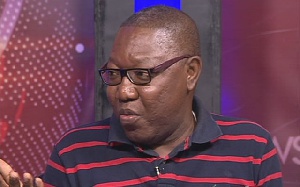 MP for Builsa South, Dr Clement Apaak
MP for Builsa South, Dr Clement Apaak
The National Democratic Congress (NDC) Member of Parliament (MP) for Builsa South, Dr Clement Apaak, has instituted a court action against the Attorney-General of Ghana, Gloria Akuffo, challenging the legality of the 3% VAT flat rate charged on importers of taxable suppliers who either sell their goods to retailers or directly to consumers.
The suit was filed at an Accra High Court (Commercial Division) on Monday, July 17, 2017, by Dr Dominic Akuritinga Ayine, on behalf of Dr Apaak.
In 2013, Parliament amended the Value Added Tax Act by the enactment of the Value Added Tax (Amendment) Act, 2013 (Act 870) which was also further amended by the Value Added Tax (Amendment) Act, 2017 (Act 948).
The purpose of Act 948 was among others; provide legal backing to the VAT Flat Rate Scheme (VFRS) to facilitate the collection of value added tax on the supply of goods in the distribution chain.
The Act imposes a flat value added tax at a rate of 3% calculated on the value of the taxable supply and proceeds to disqualify a person subject to the flat rate from deducting input tax in respect of goods subject to the tax (taxable supply).
In the view of Dr Clement Apaak, per Section 1(a) of the 2017 VAT Act, wholesalers and retailers of taxable goods are placed on the VFRS and are therefore statutorily disqualified from deducting the input from their sale of taxable supplies.
However, the Attorney-General for purposes of implementing the VFRS, issued a Practice Note numbered IDT/2017/001 and dated June 23, 2017, and titled “Practice Note on the Application of the VAT Flat Rate Scheme under the Value Added Tax Act, 2013 (Act 870).
The said Practice Note, according to Dr Apaak, purports to implement section 1(a) of the 2017 VAT Act by seeking to extend the coverage of the VFRS to importers of taxable suppliers who either sell their goods to retailers or directly to consumers.
He argued that the A-G in implementing the said VFRS stated categorically that though importers have been placed on the VFRS and are thus subject to the charge of VAT/NHIL at 3%, they will continue to pay the VAT/NHIL at importation at the standard rate of 17.5%.
This, Dr Apaak considers illegal since the purported act of subjecting importers to both the VFRS and the standard rate is unlawful as there is a justifiable legal basis for it in the 2017 VAT Act.
According to him, since the A-G seeks to impose both the VFRS and the Standard rate of VAT on importers of taxable goods, she cannot at the same time disqualify such importers from deducting their input tax, a right available to all other persons subject to the payment of the standard rate of VAT.
To him, wholesalers and retailers placed on the VFRS upon the coming into force of the 2017 VAT Act have an accrued property right to deduct the input tax on VAT paid prior to the coming into force of the “Act and the Act cannot retroactively take away this right.”
Worried about this alleged unlawful act, Dr Apaak is therefore, praying to the court for a declaration that the A-G’s purported act of extending the coverage of the VFRS to importers of taxable goods through the aforesaid Practice Note is unlawful.
He is also praying to the court for a declaration that by subjecting importers to both the VFRS and the standard rate of VAT whilst at the same time barring the said importers from deducting input VAT, the A-G has discriminated against the said importers in contravention of article 17 of the Constitution.
Dr Apaak is also seeking a declaration that all persons currently under the VFRS who paid VAT at the standard rate prior to the coming into force of the 2017 VAT Act have accrued rights to deduct input VAT paid prior to the coming into force of the said VAT.
Furthermore, he is seeking an order for the refund of all input VAT paid or in the case of VAT that is payable, a set-off against VAT to be paid under and by virtue of the VFRS, and any such further order or orders at the Court deems necessary in the circumstances of the case.